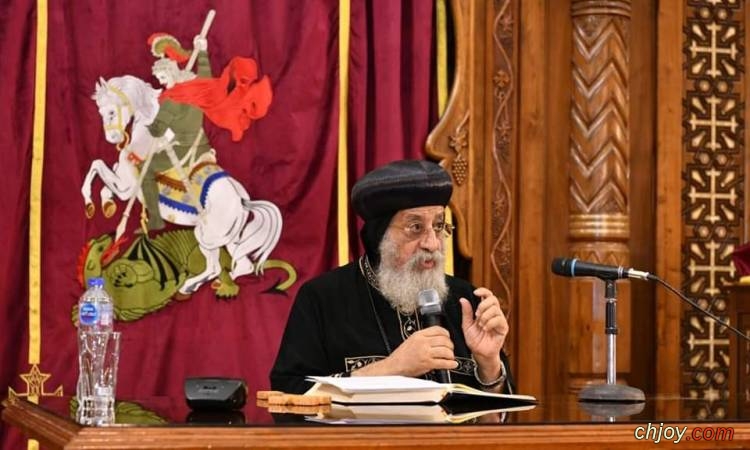
 |
 |
 |
 |
|
رقم المشاركة : ( 1 )
|
|||||||||||
|
|||||||||||
 قداسة البابا تواضروس الثاني Editorial Article by H.H. Pope Tawadros II in Kiraza Magazine: The Greatest Consolation The hours of a day for a person are usually divided into three equal parts: – 8 hours for sleep, which is the primary human need – 8 hours for work, study, and research, which are hours of productivity – 8 hours that vary from person to person but are typically spent on activities such as family, friends, worship, health, hobbies, reading, service, and personal matters. It is known that all humans share the same daily gift of time, as everyone receives 24 hours each day, regardless of their age, work, qualifications, health, or service. People constantly seek consolation / comfort / rest, whether personal, familial, or social. One of the Ten Commandments is: “Remember the Sabbath day, to keep it holy” (Exodus 20:8, NKJV), which means dedicating it to acts of love, mercy, worship, and abstaining from all forms of earthly work to make it a day dedicated to God. The creation process, which spanned six days and culminated by the creation of man as male and female on the sixth day, then it is written: “… on the seventh day God ended His work which He had done, and He rested on the seventh day from all His work which He had done. Then God blessed the seventh day and sanctified it, because in it He rested from all His work which God had created and made” (Genesis 2:2-3). In the context of the commandment, ‘consolation’ symbolizes liberation from work and responsibility, not laziness and sleep, despite humans spending a third of their lives in sleep and relaxation. This is considered one of the mysteries by human studies scholars: Why does a person sleep? The simple answer is to rest. The unanswered question by scientists is: Why rest? In the history of the Israelites, they longed for the land of rest or the Promised Land, as described in the Old Testament, considering it the anticipated rest, but they never truly enjoyed it. It is said that the city of peace, Jerusalem, which was built three thousand years ago, only experienced thirty years of peace throughout its long history. This brings the personal question: What is the greatest consolation for a human? The astonishing answer is that the greatest consolation is serving others, exerting effort, and sacrificing for them. The inner peace felt after serving others in any field of service is profound, and perhaps this is why organizations like the Red Cross or Doctors Without Borders, which rely on voluntary service without any material benefits, exist. Their service extends across nations and peoples without any specific purpose other than to help and serve humans in times of crisis, purely for the inner peace it brings. Socially, the concept of consolation varies from person to person. Some consider it a vacation, a trip, traveling to other countries, strolling in gardens, or resting at home in all its forms. These, however, differ from the concepts of laziness, slackness, and avoiding work, even sleeping at non-night hours or not exerting effort in any form. It is written: “The lazy man does not roast what he took in hunting” (Proverbs 12:27). One of the most beautiful biblical passages on this subject is from Proverbs: “Go to the ant, you sluggard! Consider her ways and be wise” (Proverbs 6:6). Therefore, true consolation is the exerting effort for the sake of others, as Christ came to us to complete the work of salvation for humanity, saying on the Cross: “It is finished!” (John 19:30). The sacrifice of the Cross and its suffering was the gift of salvation for mankind and God’s joy for His creation to have eternal life: “For God so loved the world that He gave His only begotten Son, that whoever believes in Him should not perish but have everlasting life” (John 3:16). There is, of course, a significant difference between working for a job with a salary or financial compensation and a hobby practiced without payment or material benefit, merely for the enjoyment and psychological consolation it brings, making a person spend hours and hours without exhaustion or boredom, achieving inner peace. This applies to serving others in many fields, with the goal being to make others happy, whether an orphaned child, a person with special needs, a patient, an elderly individual, or helping people in times of distress and natural disasters or conflicts and wars. Dear reader, you will not feel true comfort unless you exert yourself in serving others: – Parents who give so much in raising and nurturing their children. – Teachers who impart life experiences to all their students with effort and dedication. – Servants who tirelessly visit their children and tie them vitally to the Church. – Priests who dedicate their lives to serving and caring for their people in all aspects. – Church or civil officials in their service or work related to helping others and facilitating life for them. The consolation derived from serving others, wherever they are and whenever they appear, protects a person from selfishness and self-centeredness, as it leads a person out of self-absorption to others in effort, sacrifice, and true dedication, making them feel their humanity and their purpose in life as God intended. The same applies when inviting someone to service, consecration, priesthood, or episcopacy; it is not an invitation for promotion, position, or leadership, but an invitation to “consoling effort,” meaning serving others – serving every person and the whole person. My friend, enjoy true consolation in your effort and sacrifice for everyone. |
|